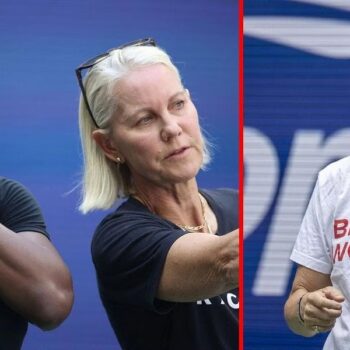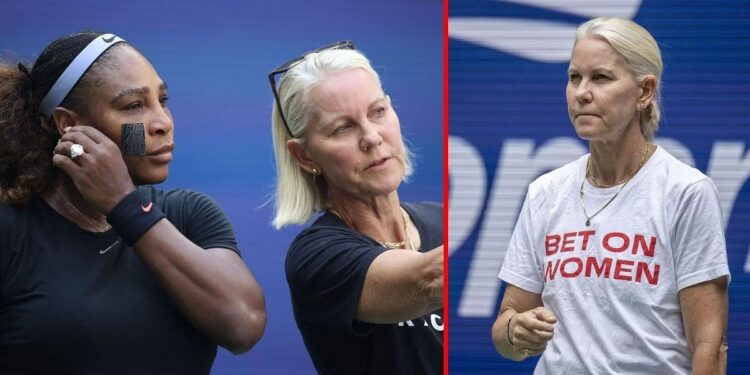**“Needs Psychiatric Help” – Serena Williams’ Ex-Coach Alarmed After Woman Goes Viral for Furiously Throwing Tennis Racket at Opponent**

In a shocking display of poor sportsmanship, a woman’s alarming behavior on the tennis court recently went viral, sparking intense reactions from the sports community.
One of the most vocal responses came from none other than Serena Williams’ former coach, Patrick Mouratoglou, who expressed his serious concerns over the incident.
Mouratoglou, a renowned figure in tennis coaching with decades of experience guiding top players, stated that the player in question “needs psychiatric help” after witnessing the video, which showed a female player throwing her tennis racket at her opponent in a fit of rage.
The incident has prompted discussions about sportsmanship, mental health, and the pressures faced by athletes on and off the court.
### **The Incident: A Display of Uncontrolled Anger**
The incident, which took place at a local tennis tournament, began to gain widespread attention after a video clip was shared on social media.
The footage shows a heated match between two female players when tensions suddenly escalated. One player, visibly frustrated after losing a crucial point, completely lost her composure and hurled her tennis racket across the court in the direction of her opponent.
The racket landed dangerously close to the other player, who appeared shocked but remained composed.
The video quickly made its way across various platforms, amassing millions of views and thousands of comments from fans, professionals, and commentators alike.
Many were left appalled by the sheer aggression displayed, calling it an unacceptable act that could have caused serious harm. The player’s lack of remorse in the immediate aftermath of the incident added fuel to the outrage, leading to calls for disciplinary action and even a potential suspension from the sport.
### **Patrick Mouratoglou’s Reaction: “This Is Not Normal”**
As reactions poured in, one comment stood out from the rest. Patrick Mouratoglou, who coached Serena Williams for nearly a decade and is known for his insight into the psychological aspects of the sport, did not hold back his thoughts on the situation.
In a series of social media posts, Mouratoglou expressed his deep concern over what he saw.
“This is not normal behavior. This player clearly needs psychiatric help,” Mouratoglou stated. “What we witnessed here is not just a moment of frustration—it’s something much deeper and more concerning. There’s no place for this kind of aggression in our sport.”
Mouratoglou’s comments have added a new dimension to the ongoing debate. While many were quick to condemn the player’s actions as merely unsportsmanlike or deserving of punishment, Mouratoglou’s remarks have shifted the focus toward the need for mental health support within the tennis community.
He highlighted that the pressures of competition can sometimes push athletes to their breaking points, and when such incidents occur, they should be addressed not just with disciplinary measures but with psychological assistance.
### **A History of On-Court Outbursts: The Mental Toll of Tennis**
Tennis, like many sports, has seen its fair share of on-court outbursts over the years. From John McEnroe’s infamous tirades to more recent controversies involving players like Nick Kyrgios and even Serena Williams herself, emotional flare-ups are not entirely uncommon.
However, the nature and severity of this particular incident have sparked a different kind of conversation.
Mouratoglou, in his statements, acknowledged that tennis is a highly demanding sport that places immense mental and emotional strain on its players.
The pressure to perform, coupled with the isolation of being alone on the court, can sometimes lead to moments of unfiltered frustration.
But he emphasized that there’s a line between losing one’s temper and resorting to acts of violence or aggression that could endanger others.
“What we need to understand is that athletes are human, too,” Mouratoglou explained. “They have emotions, they have breaking points. But when those breaking points result in actions that could harm others, it’s a sign that they need help—professional help.”
### **Sportsmanship vs. Mental Health: Where Do We Draw the Line?**
The incident has reignited a broader discussion on where to draw the line between holding athletes accountable for their actions and recognizing when they need mental health support.
Some argue that severe punishments, such as fines or suspensions, should be imposed to deter such behavior in the future. Others, like Mouratoglou, believe that it’s just as important to address the underlying issues that lead to such extreme reactions.
“I’m not saying there shouldn’t be consequences,” Mouratoglou clarified. “But we can’t just throw penalties at people and expect the problem to go away. We need to have mechanisms in place to provide athletes with the psychological help they need before things get to this point.”
### **The Aftermath: Calls for Action and Support**
In the wake of the incident, the tournament organizers released a statement condemning the player’s behavior and promising to conduct a thorough review. The player in question has reportedly been temporarily suspended from participating in future events pending an investigation.
There have also been calls from various quarters to ensure that such incidents are handled with a combination of disciplinary action and mental health support.
Many tennis professionals have since weighed in on the debate, sharing their own experiences with the mental demands of the sport and echoing Mouratoglou’s concerns.
Some have even suggested the introduction of mandatory mental health evaluations and counseling for players, especially at the junior and amateur levels, to help prevent similar incidents in the future.
### **A Teachable Moment for the Sport?**
While the incident itself was undoubtedly alarming, it has also served as a teachable moment for the sport of tennis. It has highlighted the need for a more holistic approach to player development, one that includes not just physical and technical training but also psychological support.
Mouratoglou concluded his commentary by expressing hope that this incident would lead to positive changes.
“We need to create an environment where players feel supported, not just pressured to win. When we ignore the mental side of the sport, we risk these kinds of breakdowns. It’s time to take mental health seriously—before it’s too late.”
The incident and Mouratoglou’s reaction have prompted a wave of responses from fans and professionals, indicating that this may be the beginning of a broader movement toward prioritizing mental health in sports.
As the investigation continues, the hope is that both the player involved and the sport itself can emerge stronger, with new mechanisms in place to support athletes not just as competitors but as people.








